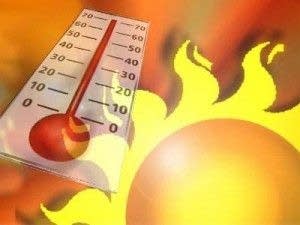What climate change looks like: Greenland record heat & “glacial” floods

96F high temps at MSP Airport Monday at 2:50pm
1st 90 degree day in 6 days (94F last Tuesday July 17th)
23rd day of 90+ heat so far in 2012
13 for 23 13 days so far in July at or above 90 degrees
Create a More Connected Minnesota
MPR News is your trusted resource for the news you need. With your support, MPR News brings accessible, courageous journalism and authentic conversation to everyone - free of paywalls and barriers. Your gift makes a difference.
80s likely most of the rest of this week
Scattered T-Storms growing rain & thunder chances this week
Fresh air Friday - cooler & much less humid by Friday & Saturday
"Steamy Monday:"
Monday certainly delivered on advertised temps above 90 degrees in the metro. The high of 96 degrees at MSP Airport was the hottest in a week, but well short of the record of 105 set back in 1934.
Temps above 90 blanketed the metro Monday afternoon.
Source: WxUnderground
That may be the last of the 90s for the Twin Cities this week. We'll make a run at 90 again Tuesday, before a gathering low pressure system deepens and moves into Minnesota from the west.
The system will trigger occasional showers & T-Storms through Wednesday. The best chance for heavy storms appears to be from "nocturnal" storms during the overnight and early morning hours...but a few daytime storms can't be ruled out.
The increased cloud cover and debris clouds should limit high to the upper 80s for most of the rest of this week.
The latest model solutions seem to favor the most rain in a zone between the Twin Cities Brainerd and Duluth this week. Some (lucky) areas could see 1" to 2"+ rainfall by Thursday.
http://wxcaster.com/gis-radar-overlays.php3?STATIONID=MPX
"Fresh Air Friday" ahead this week:
Last week I talked about a potential pattern shift that could bring some cooler & drier Canadian air to Minnesota late this week. It looks like our "Fresh Air Friday" is still on track.
A cooler northwest flow should deliver some refreshing Canadian air into Minnesota Friday & Saturday.
Highs may top out near 80 in the metro Friday, and I wouldn't be shocked to see (especially north) metro locations top out in the upper 70s Friday & Saturday. Overnight lows should be in the low 60s...with some upper 50s likely in the north metro suburbs Friday & Saturday morning.
Source: NOAA/Iowa State University
Dew points should drop into the comfy 50s. This will truly be an opportunity to shut off overworked AC units and open the windows for a fresh cooling breeze at night this weekend.
Greenland "heat" records & "glacial flooding"
If you've ever wondered what climate change looks like, this may be one answer.
Some of Greenland's high glaciers set temperature record in the past week. The resulting melt water and runoff flooded the valleys below, taking out bridges and tractors along the way.
Check out the photos and video.
WxUnderground's Jeff Masters expands on the details.
Record heat leads to major flooding in Greenland
The record heat has triggered significant melting of Greenland's Ice Sheet. According to the Arctic Sea Ice Blog, on July 11, glacier melt water from the Russell Glacier flooded the Watson River, smashing two bridges connecting the north and south of Kangerlussuaq (Sønder Strømfjord), a small settlement in southwestern Greenland. The flow rate of 3.5 million liters/sec was almost double the previous record flow rate.
The coldest place in Greenland, and often the entire Northern Hemisphere, is commonly the Summit Station. Located at the top of the Greenland Ice Sheet, 10,552 feet (3207 meters) above sea level, and 415 miles (670 km) north of the Arctic Circle, Summit rarely sees temperatures that rise above the freezing mark. In the 12-year span 2000 - 2011, Summit temperatures rose above freezing only four times, according to weather records researcher Maximiliano Herrera. But remarkably, over the past week, temperatures at Summit have eclipsed the freezing mark on five days, including four days in a row from July 11 - 14.
In addition, NOAA and the University of Illinois Cryosphere Today tells us that Arctic Sea Ice reached the lowest level ever recorded as of July 22nd.
Source: University of Illinois Cryosphere Today
4th warmest June marks 328th consecutive "above average" month globally
Do you have kids under 27 years old? We'll they've never experienced a "cooler than average" month globally in their lifetime.
June marks the 328th consecutive month of global temps warmer than the 20th century average. The last "colder than average" month was February of 1985.
The odds of that happening? We'll it's more than there are stars in the universe according to an excellent piece by Bill McKibbon in Rolling Stone.
If the pictures of those towering wildfires in Colorado haven't convinced you, or the size of your AC bill this summer, here are some hard numbers about climate change: June broke or tied 3,215 high-temperature records across the United States. That followed the warmest May on record for the Northern Hemisphere - the 327th consecutive month in which the temperature of the entire globe exceeded the 20th-century average, the odds of which occurring by simple chance were 3.7 x 10-99, a number considerably larger than the number of stars in the universe.
PH